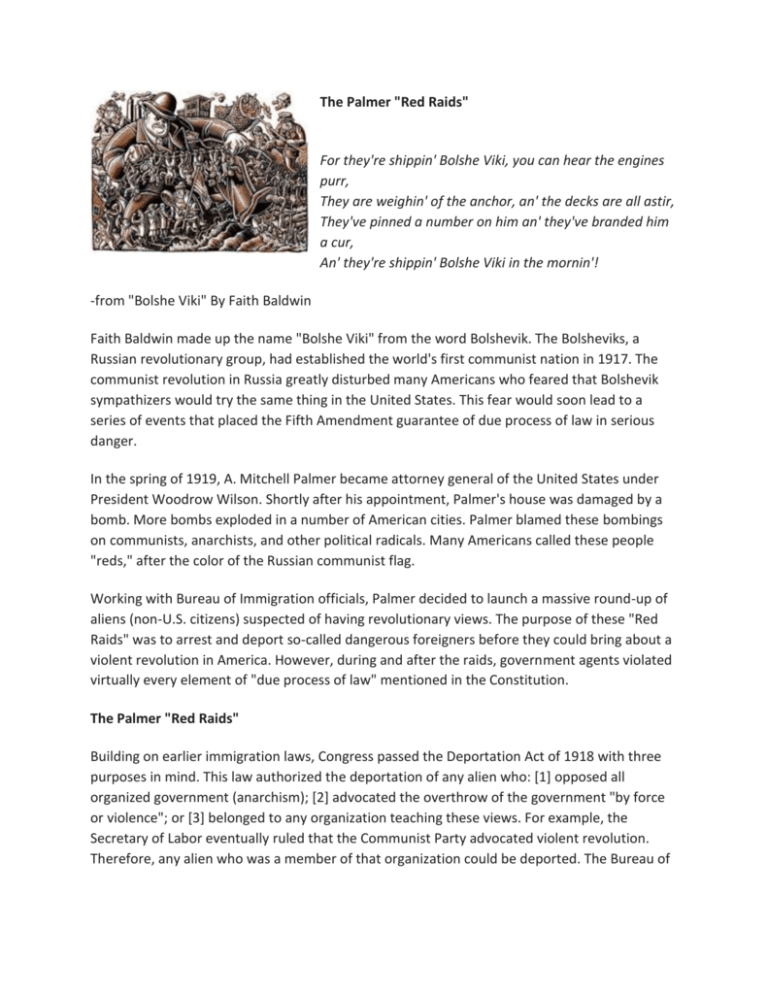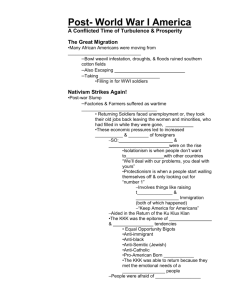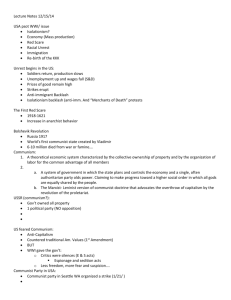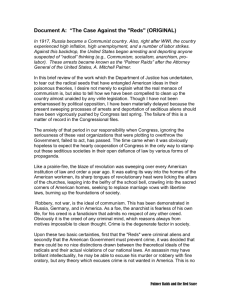The Palmer "Red Raids" For they're shippin' Bolshe Viki, you can
advertisement

The Palmer "Red Raids" For they're shippin' Bolshe Viki, you can hear the engines purr, They are weighin' of the anchor, an' the decks are all astir, They've pinned a number on him an' they've branded him a cur, An' they're shippin' Bolshe Viki in the mornin'! -from "Bolshe Viki" By Faith Baldwin Faith Baldwin made up the name "Bolshe Viki" from the word Bolshevik. The Bolsheviks, a Russian revolutionary group, had established the world's first communist nation in 1917. The communist revolution in Russia greatly disturbed many Americans who feared that Bolshevik sympathizers would try the same thing in the United States. This fear would soon lead to a series of events that placed the Fifth Amendment guarantee of due process of law in serious danger. In the spring of 1919, A. Mitchell Palmer became attorney general of the United States under President Woodrow Wilson. Shortly after his appointment, Palmer's house was damaged by a bomb. More bombs exploded in a number of American cities. Palmer blamed these bombings on communists, anarchists, and other political radicals. Many Americans called these people "reds," after the color of the Russian communist flag. Working with Bureau of Immigration officials, Palmer decided to launch a massive round-up of aliens (non-U.S. citizens) suspected of having revolutionary views. The purpose of these "Red Raids" was to arrest and deport so-called dangerous foreigners before they could bring about a violent revolution in America. However, during and after the raids, government agents violated virtually every element of "due process of law" mentioned in the Constitution. The Palmer "Red Raids" Building on earlier immigration laws, Congress passed the Deportation Act of 1918 with three purposes in mind. This law authorized the deportation of any alien who: [1] opposed all organized government (anarchism); [2] advocated the overthrow of the government "by force or violence"; or [3] belonged to any organization teaching these views. For example, the Secretary of Labor eventually ruled that the Communist Party advocated violent revolution. Therefore, any alien who was a member of that organization could be deported. The Bureau of Immigration (then part of the Department of Labor) often decided who would be deported under this law. Even though deportation matters were not normally the concern of the Department of Justice, Attorney General Palmer soon created an alliance with officials in the Bureau of Immigration to find and deport alien "reds." J. Edgar Hoover, Palmer's chief investigating officer, ordered Justice Department agents to go undercover and join suspected radical organizations. By December 1919, Palmer, Hoover, and their allies in the Bureau of Immigration had decided to arrest alien members of the Communist Party and other foreign radicals. Hoover issued the instructions to Department of Justice agents which called for the arrests to take place during a series of raids planned for the evening of January 2, 1920. The Palmer "Red Raids" took place on schedule in more than 30 cities, located mainly in eastern states. Between six and ten thousand people were arrested. In many cases, arrest warrants had not been issued until after individuals found themselves in custody. Moreover, Department of Justice agents rarely carried search warrants during the raids. Nevertheless, the raiders seized political literature, membership cards and lists, organization records, and other papers. Very little evidence of revolutionary or criminal activity actually turned up. Days after the raids, thousands of aliens were still being held without formal charge, without bail, without the assistance of a lawyer and in many cases, without family or friends knowing where they were. The Deportation Hearings The arrested aliens were not charged with any crime. Only one question mattered: did they believe in radical ideas or belong to any organization that did. If this could be established in the case of an individual alien, he or she could be deported. Due process rights did not apply to these criminal arrests. Instead, the judgment to deport or not deport an alien was made by an immigration inspector in a secret hearing. During a typical deportation hearing at this time, the immigration inspector acted as arresting officer, prosecutor, judge, jury, and recording clerk. A defense lawyer was not permitted to attend while the immigration inspector questioned the alien (many of whom understood little English). The interrogation focused not only on what the alien had done and said, but also on his or her beliefs and thoughts. In one well-documented case, Gaspare Cannone was arrested without charge or warrant by Department of Justice agents in New York City. Cannone, who spoke limited English, was beaten and kicked when he refused to give evidence against other people. After being held in secret for 72 hours, agents took him to Ellis Island and turned over to Bureau of Immigration officials. Following questioning by an immigration inspector, Cannone refused to sign a statement admitting he was an anarchist. But someone forged his signature to the statement anyway.






